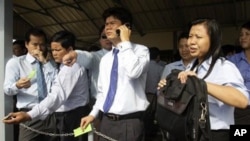Cambodia’s universities were devastated in the 1970s by the civil war and the brutal Khmer Rouge era, when education was abolished and academics were actively targeted. For many more years afterward, the sector was not prioritized, as basic education services had to be restored.
Now, much progress has been made, and thousands of young Cambodians graduate each year from the country’s 162 higher education institutions. But teaching is still the overriding concern, and scholars say there remain significant obstacles to conducting original research and furthering knowledge.
“The main income of the universities comes from the students’ tuition fees, so most Cambodian universities offer teaching services rather than research,” said Ros Vutha, a master’s graduate in higher education and a lecturer at Phnom Penh’s Institute of Foreign Languages.
Funding for research is scarce, and many researchers simply go off on their own to do more ambitious work. Even when research is done, however, there are few places to have it published locally. Local scholars therefore must collaborate with foreign researchers to get their work published, said Vutha.
“Everyone thinks conducting research is important and values it, but how far we can make it happen is another matter,” he said.
Sok Udom Deth, vice-rector for academic affairs at Zaman University, said universities need to be able to give their students an education that keeps up with a fast-changing world.
“No matter what majors we teach at university, it requires all professors to do research to get updated with new discoveries, or else your knowledge becomes old,” he said. “For example, I’m teaching an international relations major. For the past four years, we talked about Al-Qaida, but now we have to talk about ISIS instead.”
He agreed that institutions have limited funds for research, but pointed out that researchers could also seek funding from international programs or organizations that have an interest in their field of study.
There are few incentives for Cambodian scholars to do research, Sok Udom Deth said, noting that, in other countries, job promotions within the faculty—from assistant professor to associate professor to full professor—were often the reward for innovative work.
But a rising number of Cambodian scholars are interested in doing research, according a report published by the Cambodian Institute for Cooperation and Peace (CICP) in April, which also recognized the constraints of heavy workloads and finances.
Supported by the Bill and Melinda Gates Foundation, the report said that part of the problem was a lack of self-evaluation by higher education institutions and by the Ministry of Education, Youth and Sport itself.
Pou Sovachana, the CICP’s deputy director in charge of research and publications, said some good policies on research were in place, but were not being implemented.
“Without proper in-depth research and a solid foundation, a country cannot have sustainable development. Research should be a priority,” said Sovachana, adding that, too often, the funding that is available for research is tightly directed by donors.
“Although the funding is available, the researcher needs to adjust their interest to the fund’s objective. It’s the donor’s vision, not the researcher’s or the society’s interest.”
Ministry spokesman Ros Salin said research was a key part of the government’s Higher Education Vision 2030, a plan released in 2014 that aims to build a university system fit for the era of globalization.
“Together with the education committee, the government policy is to encourage more research in higher education institutions,” he said. “It is the compass for all higher education institutions for the better education system in Cambodia.”
Another factor holding back some scholars from research may be sensitivity over research topics. The government insists that education is a non-political space, meaning that papers or discussions challenging the status quo in the country may not be received well by administrators.
“I was warned not to talk about politics at school,” noted Sovachana, explaining that, in fact, challenging research should be welcomed.
“Research can affect politics because we are figuring the problems in society and seeking for the solutions,” he said. “But doing research isn’t about attacking each other, we work to reflect the reality and to document the data and information for the purpose of social development.”
Another limiting factor for academics is that many fear of saying something controversial in public, and therefore avoid speaking to the media.
Sok Udom Deth said it would be preferable to have an atmosphere where academics felt free to inform the public about important issues. “The findings from social science are vital for policy development, so the government can find them useful,” he said.
Ministry spokesman Salin said that, in the most part, politics was irrelevant to educational institutions.
“If they want to do research on political topic, they can do it under the political science topic—on political regimes or political structures,” he said, adding that everyone should, “Make sure there’s no political propaganda at school.”







